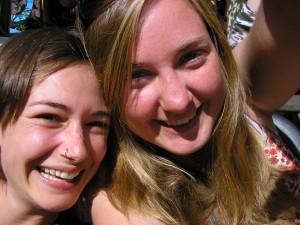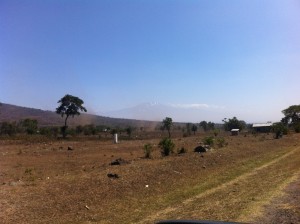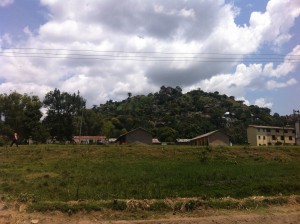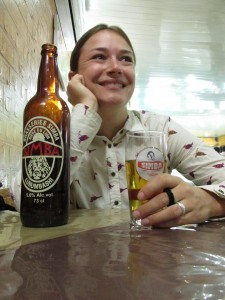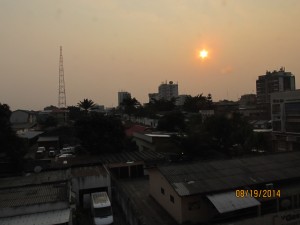As I write this, I am sitting at the bar of my hotel in Kigali, having my last pint of Primus before I leave for the airport. There’s a lot to reflect on about my trip to Congo, so I am going to write down some vignettes of some of the memories I will take with me. While Katanga was an interesting duststorm, it was East Congo, particularly South Kivu, which really captured my heart.

Northern Katanga
I must admit that I was biased toward South Kivu before I even got there because I’d worked on a 3-year long project with WWF on artisanal mining in a protected area called the Itombwe Nature Reserve (see here: http://www.asm-pace.org/projects/asm-itombwe-nature-reserve-drc.html). For that project, I had to leave the fieldwork to my Congolese colleagues, so I was especially looking forward to seeing the place for myself. Bukavu did not disappoint me.
Picture a jam-packed city situated on the banks of Lake Kivu. The city is built along several arms of land which stretch out into the water, so no matter where you are, you have a stunning view of the water, the hills and the distant mountains. It puts Vancouver to shame! The bulk of the residential areas are spread out across the many hills, giving it the look of a Mediterranean city. It was built during the colonial period for around 300,000 people, but since the war(s) and the increase of mining in the area, nearly a million people are now crowded into this place. Traffic is a total disaster. The only time we tried to drive in town, we were in a minor accident!
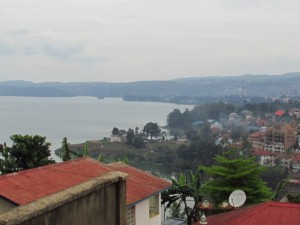
Bukavu
One Sunday evening I had a bit of spare time and went for a long swim in the lake. I’d wanted to do this in Lake Tanganyika when we were in Katanga, but was warned off because of crocs. However, given its altitude and ecosystem, Lake Kivu is croc-free. I do believe I shocked quite a few people on shore, as I found out later that the locals believe there are Lake Monsters living in its depths. There were a couple children waving frantically at me, shrieking, “Muzungu, muzungu, venez-ici!” (Muzungu means whitey in Swahili. Apparently it’s not a derogatory term; just a nuisance once you’ve heard it called at you several hundred times). I can’t even tell you how lovely it was to swim on my back and stare at the sky as the sun was setting.
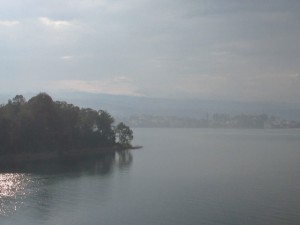
Lil swimming hole
I fell in love with the gorgeous and open faces—so many smiles. We managed to cram in a huge number of interviews with different stakeholders and I was struck with how articulate people are about their opinions. They seemed so much more self-reflective than most people I know. Is that a result of decades of conflict? Or are people so flexible and intelligent simply due to the fact that they never had a government they could rely on to provide any of the their basic needs? The people I met were so family oriented; very Catholic; very pro-marriage. One man talked our ear off about how a husband is obliged to love his wife unconditionally, regardless of her faults; and the wife, likewise, should submit to her husband, do all the housework and depend on him to provide for the (large) family. Although, according to this man, he was left with the brunt of cleaning house and taking care of their ten children because his wife was often “at Church, fighting her demons.”
When we left for Goma, the capital of North Kivu, I was sad to leave Bukavu behind. Goma is a conglomeration of torn up streets, back roads made entirely of dried lava, and massive promenades. After the lovely mess of Bukavu, I was in a bit of shock. Most of our days there were cloudy, but sometimes through the mist I could see the outline of Mount Nyiragongo, the huge volcano 20 km north of the city. Who in their right mind builds a major provincial capitol virtually at the base of an active volcano?? The last time it erupted was in 2002 and apparently the lava flowed down the main streets in a surreal horror-movie like event. Many people died and yet the city perseveres, despite the bumpy roads and ongoing reconstruction. On an aside, it’s just one example of how difficult it is to get things done in Congo that they are still rebuilding the houses and offices destroyed nearly twelve years ago by the volcano.
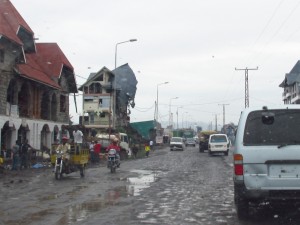
Goma
The people in North Kivu have harder faces. I felt the difference in mood the moment I arrived. There does not seem to be as much joy as in Bukavu; rather, business and commerce is the centre of all things. It’s understandable that there would be a bit more of a guarded and calculating vibe in Goma; it was, after all, not even two years ago that the M23 militia took over the city and was subsequently driven out by the Congolese Army. The province has been in a state of relative peace for less than a year, but there are still armed groups active in some of the more remote areas. You have to understand that these people have seen conflict very recently. And maybe that explains the fear in their faces. I never felt unsafe, but neither did I feel extremely comfortable either.
Another thing I noticed was the curiosity and entitlement of people, especially children. When we did one of our mine site visits about two hours outside of Goma, we passed a large expanse of tents with UNHCR tarps. Here is where many internally displaced people live, many of whom haven’t been able to return to their homes in a decade. Kids followed our car in droves, holding out their hands and calling out “MONUC, biscuit!”—they were probably told to call us that by their older brothers and sisters, a likely result of associating all white people with the former UN peacekeepers, MONUC. It was a little disturbing, to be honest. If this is how the children feel—and, really, they don’t yet possess the social conventions to keep their mouths shut—what kind of dependence must their parents feel toward foreigners?
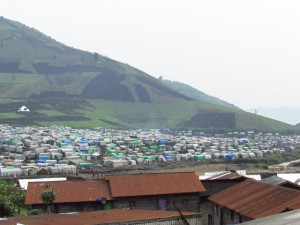
UNHCR tents
And again, once we arrived in the village and were waiting to meet the traditional authorities, more than fifty children surrounded us and just stared, completely rapt. Me putting on chap-stick was apparently the most interesting thing they’d seen. Nynke, my colleague, asked them why they were staring at us and one boy replied, “we are staring because you are invisible.” Our entourage followed us around for the better part of the morning, with one of the older boys pointing the camera of his phone and videotaping us. I guess we deserve a taste of our own medicine after centuries of white people coming to their country, taking hundreds of photos and treating them like foreign spectacles.
I don’t really know how to finish this post. Congo has been, hands down, the most amazing country I have visited (and I’m going on 30 countries!). I can’t put my finger on why it captures my heart so intensely, and yet it does, year after year. There is so much beauty and chaos and love, like nothing I have ever seen. I wish I could take you all for a swim in Lake Kivu and a hike to see the gorillas in Kahuzi-Biéga National Park. The place makes me want to laugh and cry at the same time–laugh because the way things happen are so absolutely absurd (like, for example, when our driver in North Katanga sideswiped an army truck loaded with timber, nearly losing his side mirror in the process. Then he couldn’t move because one of the pieces of timber had come through our open window! Ten soldiers lifted our SUV from behind, we gave them a pack of cigarettes and $5 and were on our way); and cry because things are so heart-wrenching here (like when my former colleague at WWF told me of how, when the M23 invaded Goma, he crossed the border from Rwanda on foot, carrying $20,000 in the pockets of his vest so that he could pay his staff before they went underground). I am absolutely in awe with how this country gets by, just barely, by its bootstraps.
It’s lovely, truly.
PS. Happy birthday to my loveliest one!!!
